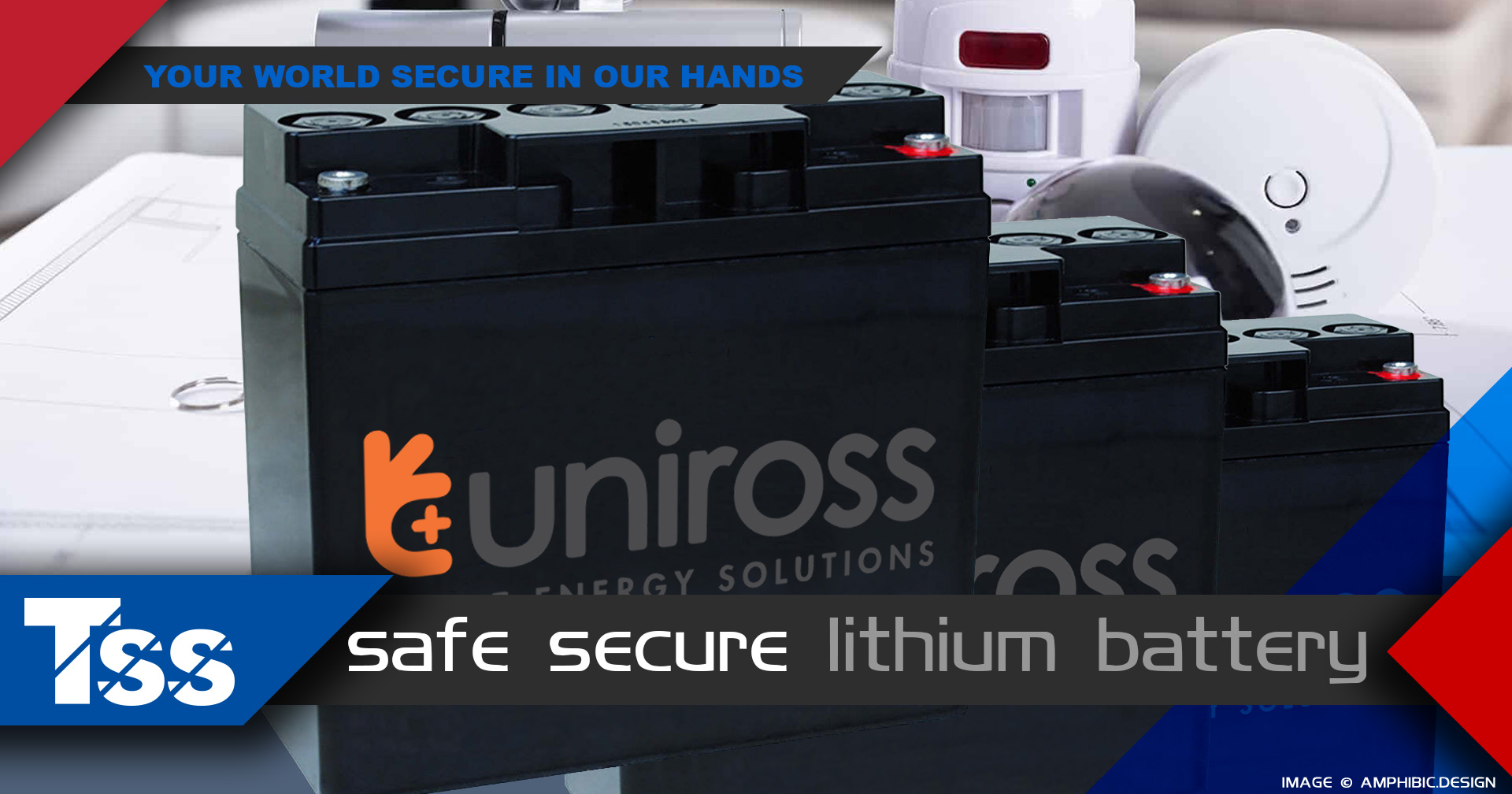
How Safe Is a Uniross Lithium Battery?
When it comes to batteries, safety is without a doubt the most important aspect. We’ve all read about the dangers of batteries or watched a YouTube video of a battery fire. So it’s only normal to be concerned about putting a Lithium battery into your Alarm, Gate Motor or Electric Fence. But there’s no need to be concerned if you’re using a Uniross Lithium battery.
Uniross makes use of one of the safest Lithium chemistries on the market today – Lithium Iron Phosphate (Li-FePO4). It will withstand abuse like no other battery chemistry. Even if you were to subject a Uniross Lithium battery to extreme temperatures, Short Circuits or worse still, crushing the battery, it won’t catch fire or explode.
Independent Testing
If that’s still not enough to put your mind at ease, you don’t have to take our word for it, we’ve had our batteries independently tested by an international test company and certified in accordance with the United Nations Transport standard – UN38.3. During this certification process, the Uniross Lithium 12v 7Ah battery was subjected to a multitude of abusive and destructive tests and passed with flying colours.
External Short Circuit Test
Our battery was subjected to a direct short circuit across the battery terminals for a minimum period of one hour.
In order to pass, our battery had to withstand this short circuit for at least one hour without the battery temperature exceeding 170°C. In addition, our battery was not allowed to rupture or catch fire during the test as well as within six hours after the test.
If we compare this to an old Lead type battery that is usually found in an Alarm, Gate Motor or Electric Fence, the Lithium battery is far safer. A Lead battery under these conditions would most certainly pose a severe safety hazard.
Overcharge Test
Our battery was subjected to a charge current of more than twice our recommended continuous charge current, for a period of 24 hours. Our battery was not allowed to catch fire during the test, nor within seven days after the test.
Crush Test:
This test required the test company to crush the cells between two flat surfaces until the first of three results were reached:
- The applied force reached 13kN
- The voltage of the cell dropped by at least 100mV
- The cell was deformed by 50% or more of its original thickness.
For our cells to have passed this Crush test, the external temperature was not allowed to exceed 170°C and there could be no fire during the test or within six hours after the test.
Impact Test:
Our cells were placed on a flat smooth surface and a 9.1Kg mass was dropped from a height of 61cm directly onto the cells. The cells external temperature was not allowed to exceed 170°C and there could not be any fire during the test as well as within six hours after the test.
Thermal Test
First, our battery was stored for a period of 6 six hours at 72°C, followed by a further six hours storage at a temperature of -40°C, with a 30-minute interval between the test temperature extremes. This procedure was repeated 10 times.
Our battery was not permitted to show any signs of leakage. Nor was it allowed to vent, rupture or catch fire. In addition, the open circuit voltage of the battery was not permitted to drop by less than 90% of its voltage prior to testing.
Vibration Test:
Our battery was firmly secured onto a special vibration machine in which the battery was subjected to number of sever vibrations for a period of 15 minutes. This cycle was then repeated 12 times for a total of three hours for each mounting position of the battery.
In order to pass this test, our battery could not show any signs of leakage, venting or rupture and was not allowed to catch fire during and or after the test. The open circuit voltage of the battery was then measured directly after testing and was not allowed to be less than 90% of its voltage prior to testing.
Shock Test:
Our battery was secured to the test machine and subjected to a half-sine shock of peak acceleration of 150gn and pulse duration of 6 milliseconds. Each battery was subjected to three shocks in the positive direction and three shocks in the negative direction in each of the three mounting positions for a total of 18 shocks.
The battery was considered to have passed the test if no leakage, no venting, no rupture and no fire was experienced during and or after the test and the open circuit voltage of the battery directly after testing, was not less than 90% of its voltage prior to testing.
Conclusion:
If our batteries can withstand these sorts of abusive and destructive conditions without posing any safety hazard, we are fully confident that they are perfectly safe to use in your Alarm, Gate Motor or even Electric fence.
How long will a 12v 7Ah Lithium battery last in an Alarm System?
A question we frequently get asked, is: “How long will a Uniross 12v 7Ah Lithium battery last in an Alarm System?”
It may sound like a simple question, but it’s actually a lot more complex than that. Its like asking “how long will my cellphone battery last?” It all depends on how much you use the phone, how many apps you have open, how charged the battery was to start with and also how old the battery is.
The same applies when it comes to an alarm system. It depends on the make and model of alarm panel you have and what else the panel supplies power to (like Keypads, Expander modules, Detectors etc.)
The bottom line is, in general, hardwire alarm panels are developed to provide between 700mA and 750mA for powering ancillary devices such as keypads expander modules, detectors and other 3rd party devices. Based on this and allowing a budgetary 200mAh for the Panel itself, a total of 950mA could be drawn from the panel’s standby battery during mains failures or Loadshedding. Provided no other equipment like a radio, for example, has been directly connected to the battery, a fully charged Uniross 12v 7Ah Lithium battery should last at least 4 hours.



